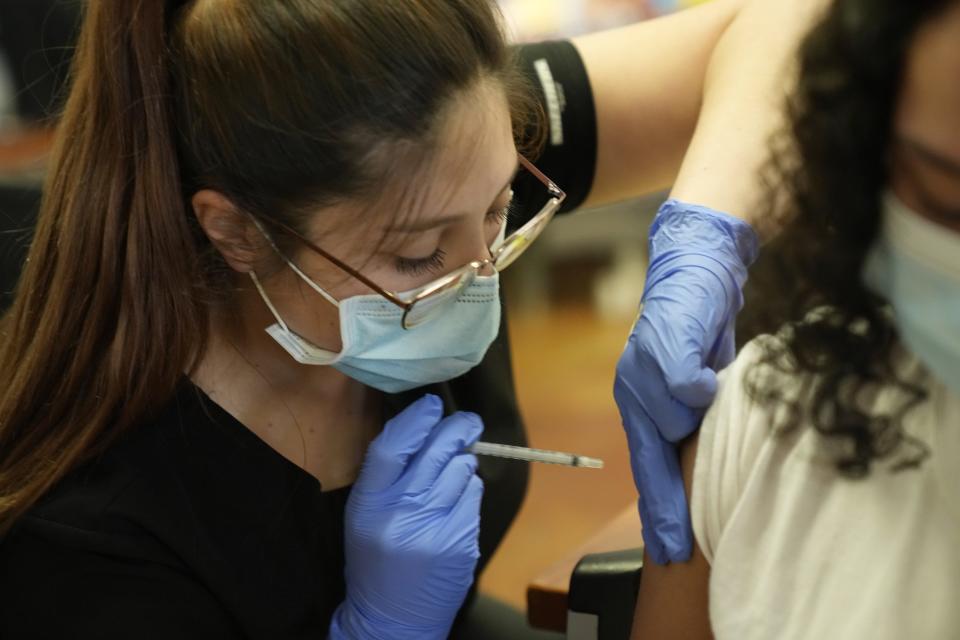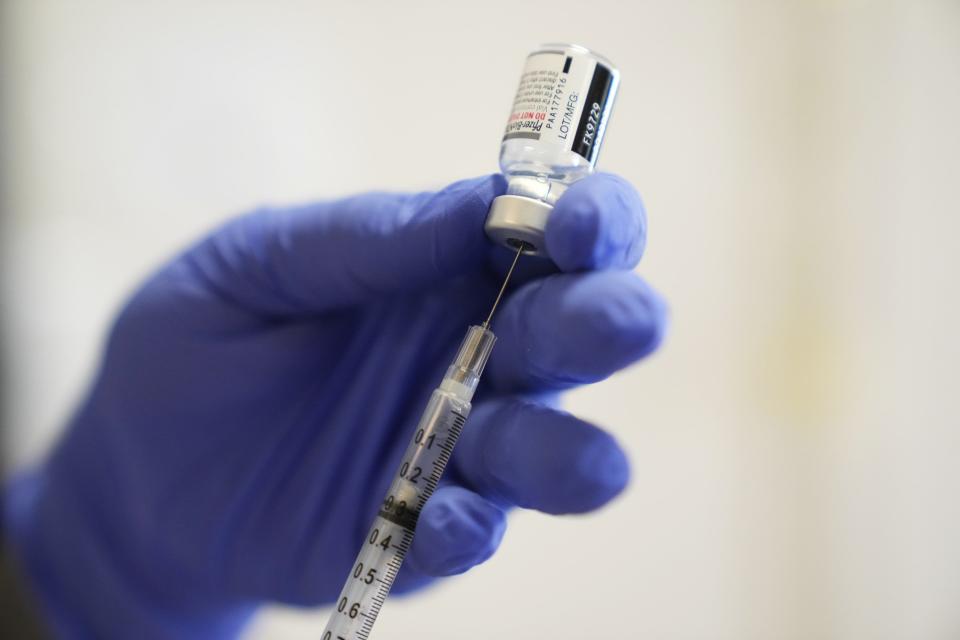CDC endorses new omicron COVID-19 booster shots: What Arizonans need to know
The Centers for Disease Control and Prevention on Thursday endorsed new booster doses of the COVID-19 vaccines that specifically target the omicron subvariants of the virus. The Food and Drug Administration also gave emergency use authorization for those boosters this week.
Arizona is seeing a decline in reported cases of the virus, but the cases that are still circulating are predominantly the BA.5 omicron subvariant. Some epidemiologists are concerned about another wave of infections this fall and winter seasons.
Existing vaccine formulations still significantly reduce the risk of hospitalization and death due to the coronavirus, but scientists hope the updated booster doses will decrease risk of infection against the currently circulating virus. So should you get the new shot?
Here’s what you need to know.
Why is there a new COVID-19 booster shot?
The virus that causes COVID-19 has changed several times since the vaccines were first developed, explained Deepta Bhattacharya, a professor of immunobiology at the University of Arizona College of Medicine in Tucson.
As the virus has evolved, it's acquired mutations that make it better at evading our immune systems. An updated version of the vaccine can help our bodies bolster defenses.
"When the vaccines are matched to the variants that are circulating, then they work better," Bhattacharya said. "That's the thinking behind adopting these vaccines."
More: 'It is spreading everywhere': What to know about the latest COVID-19 wave in Arizona
Is the new omicron booster safe, and will it protect me better than previous shots?
Yes, Bhattacharya said, the evidence shows that the new booster is safe and will likely be more effective than the existing booster.
In June, vaccine companies were wrapping up clinical trials in humans on a booster targeted to match BA.1, the omicron subvariant that caused massive surges last winter. Data showed that booster worked better than the original, but by the time the trials were completed, BA.4 and BA.5 were the dominant strains.
So researchers tweaked the "instructions" contained in the vaccine to better match the virus that's currently circulating. They tested that formulation for efficacy in mice, not in humans. That’s on par with the ways scientists update flu vaccines, which don’t require large-scale human trials.
Human trials for efficacy are also underway for the new booster, but those results won't be available until after the rollout begins. In other words, Bhattacharya said, we don't know exactly how much more effective this booster will be, but we have enough data to be confident that it will be safe and better than the shots we have now.
The FDA has also said that they believe the vaccine will be more effective against the omicron subvariants.
When will COVID omicron boosters be available?
Since the CDC has endorsed the shots, they could become available as soon as this weekend, with more quantities available after Labor Day.

Where can I get the new COVID booster shot?
You can likely receive the new booster vaccine wherever you got your previous shots. It is a single shot and the government has purchased millions of doses for the winter vaccination campaign, which means that for now, the updated boosters will be administered free of charge at most locations.
However, federal funding for the vaccines may run out next year, so they may no longer be free for all in 2023.
As the boosters are rolled out, local pharmacies, community clinics and doctor's offices will likely be able to administer the shot at the same time you get your annual flu shot. Your body's immune response will ramp up to higher levels over approximately two weeks.
Find the nearest provider to you using the state's vaccine finder.
COVID-19 weekly update: Cases increase by 8,661, with 67 new known deaths
Who is eligible to get the new booster shot?
For anyone who has already had a primary series of the coronavirus vaccine, regardless of type (e.g. Pfizer/BioNTech, Moderna, Johnson & Johnson), the FDA issued emergency use authorizations of the new booster:
For the Pfizer/BioNTech booster: 12 years or older
For the Moderna booster, 18 years or older
Bhattacharya said that people who are immunocompromised or elderly should prioritize getting the new booster. He also noted individuals who have had a primary series but have not had a booster yet can go straight to the updated booster. This means if you've only had two shots of the Moderna vaccine, your third dose can be the omicron-specific booster.
Will the new omicron-specific booster replace older boosters?
As the omicron subvariants continue to dominate, the updated booster will likely become the most useful one in our arsenal. The BA.5 subvariant makes up nearly 90% of new COVID-19 cases in the U.S., according to the Centers for Disease Control and Prevention.
However, the primary series will stay the same. If you have not yet received the first dose of the vaccine, you will still first be vaccinated with the first doses made available in 2020. Bhattacharya hopes that will change, but doesn’t know when that will happen.

How long should I wait to get the new booster if I recently had a booster or was infected?
Do not get the booster right away if you were infected or vaccinated with either the original or booster vaccines in the last two months. The FDA says getting the new booster too soon can limit its benefit.
"From a purely immunological standpoint, six to nine months would be ideal" between a previous vaccination or infection and a new booster, Bhattacharya said.
However, he noted that that window may be modified by the situation on the ground. For example, if cases begin rising, scientists may recommend another booster, say, four months later to decrease risk of infection and help slow community spread.
Will there be more new boosters in the future?
Bhattacharya thinks continually updating boosters as the virus evolves is a good idea and will likely happen again, beyond just this year.
"Based upon what we've learned from flu, updating the vaccine when the new variant comes out is useful," he said, adding that he doesn't think we have the infrastructure to roll out updated vaccines more often than once a year.
The good news, he added, is that although each variant of the coronavirus looks a bit different, parts of the virus stay the same, and that's something our immune systems can take advantage of.
With vaccination or infection, "you're going to generate some antibodies against parts of the virus that can't change, and that will only help you, even if a new variant comes down the road," he said.
And as other public health measures are removed, vaccines have become one of the primary ways individuals can try to protect themselves from illness, hospitalization and death.
That doesn't mean that individuals can't continue masking or taking other precautions, but it does mean that on a broader scale, ensuring the efficacy and implementation of updated vaccines will be important in protecting all of us.
Have a question you need answered? Reach the reporter at rromeroruiz@arizonarepublic.com. Follow him on Twitter @raphaeldelag.
Independent coverage of bioscience in Arizona is supported by a grant from the Flinn Foundation.
Melina Walling is a bioscience reporter who covers COVID-19, health, technology, agriculture and the environment. You can contact her via email at mwalling@gannett.com or on Twitter @MelinaWalling.
This article originally appeared on Arizona Republic: Omicron booster shot: What to know about new vaccine for COVID

